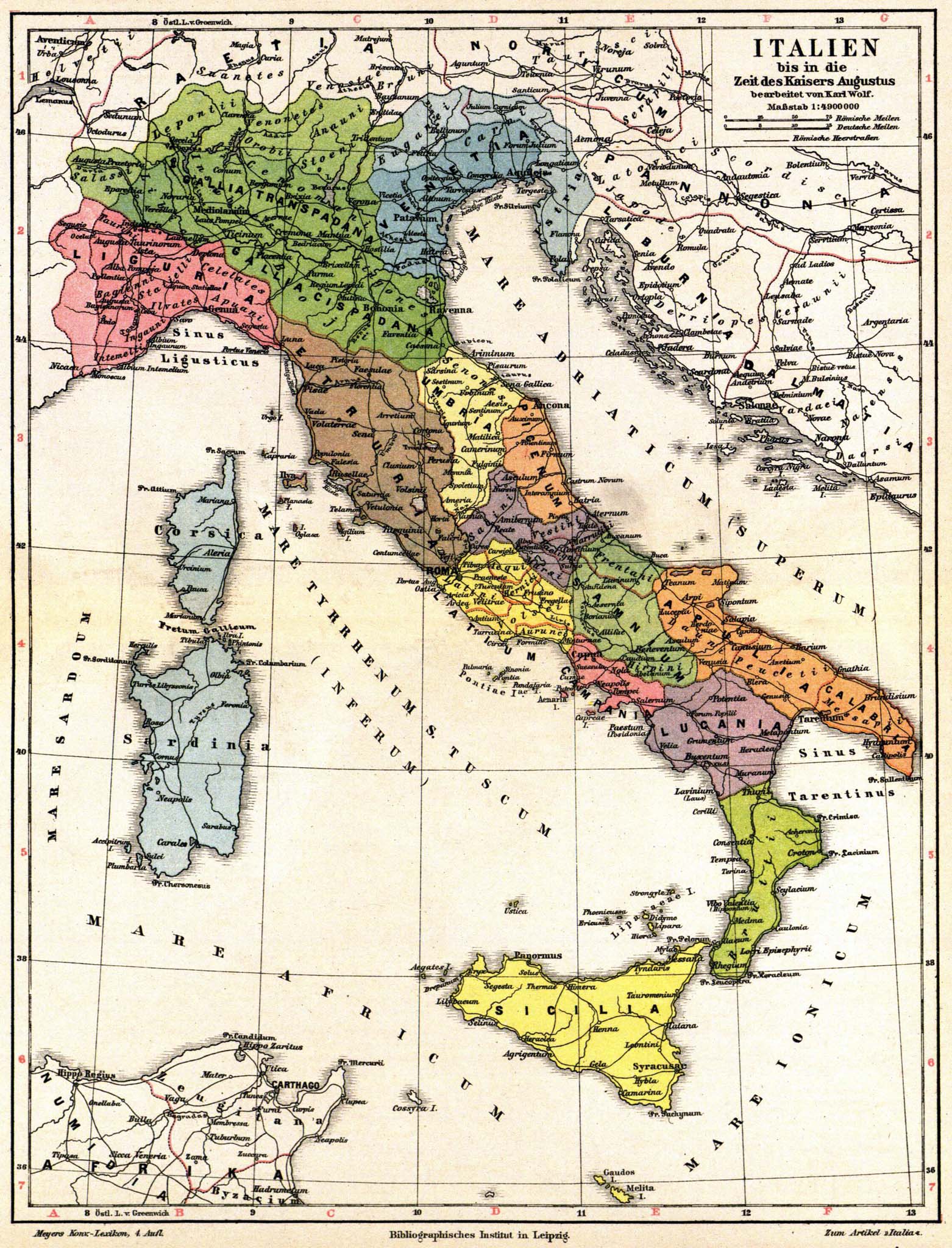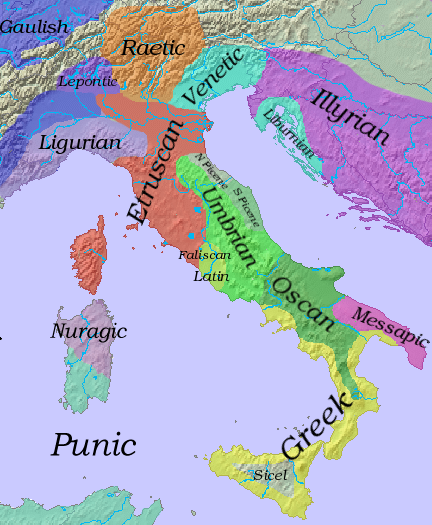Ligurian language (ancient) on:
[Wikipedia]
[Google]
[Amazon]
The Ligurian language was spoken in pre-Roman times and into the Roman era by an ancient people of north-western


 Strabo indicates that the Ligurians were different from the Celts:
Because of the strong Celtic influences on the language and culture, the Ligurians were known in antiquity as ''Celto-Ligurians'' (in Greek ''Keltolígues'') in some other sources.
Strabo indicates that the Ligurians were different from the Celts:
Because of the strong Celtic influences on the language and culture, the Ligurians were known in antiquity as ''Celto-Ligurians'' (in Greek ''Keltolígues'') in some other sources.
Italy
Italy ( it, Italia ), officially the Italian Republic, ) or the Republic of Italy, is a country in Southern Europe. It is located in the middle of the Mediterranean Sea, and its territory largely coincides with the homonymous geographical ...
and current south-eastern France
France (), officially the French Republic ( ), is a country primarily located in Western Europe. It also comprises of overseas regions and territories in the Americas and the Atlantic, Pacific and Indian Oceans. Its metropolitan area ...
known as the Ligures
The Ligures (singular Ligur; Italian: liguri; English: Ligurians) were an ancient people after whom Liguria, a region of present-day north-western Italy, is named.
Ancient Liguria corresponded more or less to the current Italian regi ...
.
Very little is known about ancient Ligurian; the lack of inscriptions and the unknown origin of the Ligurian people prevent its certain linguistic classification as a Pre-Indo-European or an Indo-European language. The linguistic hypotheses are mainly based on toponymy
Toponymy, toponymics, or toponomastics is the study of ''toponyms'' ( proper names of places, also known as place names and geographic names), including their origins, meanings, usage and types. Toponym is the general term for a proper name of ...
and onomastics.
Ancient sources

 Strabo indicates that the Ligurians were different from the Celts:
Because of the strong Celtic influences on the language and culture, the Ligurians were known in antiquity as ''Celto-Ligurians'' (in Greek ''Keltolígues'') in some other sources.
Strabo indicates that the Ligurians were different from the Celts:
Because of the strong Celtic influences on the language and culture, the Ligurians were known in antiquity as ''Celto-Ligurians'' (in Greek ''Keltolígues'') in some other sources.
Herodotus
Herodotus ( ; grc, , }; BC) was an ancient Greek historian and geographer
A geographer is a physical scientist, social scientist or humanist whose area of study is geography, the study of Earth's natural environment and human society ...
wrote that '' sigunnai'' meant 'hucksters, peddlers' among the Ligurians who lived above Massilia
Massalia (Greek: Μασσαλία; Latin: Massilia; modern Marseille) was an ancient Greek colony founded ca. 600 BC on the Mediterranean coast of present-day France, east of the river Rhône, by Ionian Greek settlers from Phocaea, in Western An ...
.
Ligurian as a Pre-Indo-European language
Scholars, such as Ernst Gamillscheg, Pia Laviosa Zambotti and Yakov Malkiel, posit that ancient Ligurian was a pre-Indo-European language, with significant late Indo-European influence, especially Celtic (Gallic) and Italic (Latin), superimposed on the original language. Their thesis is that the Ligurians were survivors of the ancient pre-Indo-European populations that had occupied Europe, at least from the fifth millennium BC. These populations would have had languages of their own families, which they would have preserved until the onset of waves of Indo-European migration. Later, the latter would conquer the territories, imposing their culture and language on the Ligurians.Ligurian as an Indo-European language and its relationship with Celtic
Xavier Delamarre argues that Ligurian was aCeltic language
The Celtic languages (usually , but sometimes ) are a group of related languages descended from Proto-Celtic. They form a branch of the Indo-European language family. The term "Celtic" was first used to describe this language group by Edward ...
, similar to, but not the same as, Gaulish
Gaulish was an ancient Celtic language spoken in parts of Continental Europe before and during the period of the Roman Empire. In the narrow sense, Gaulish was the language of the Celts of Gaul (now France, Luxembourg, Belgium, most of Switze ...
. His argument hinges on two points: firstly, the Ligurian place-name ''Genua'' (modern Genoa
Genoa ( ; it, Genova ; lij, Zêna ). is the capital of the Italian region of Liguria and the sixth-largest city in Italy. In 2015, 594,733 people lived within the city's administrative limits. As of the 2011 Italian census, the Province of ...
, located near a river
A river is a natural flowing watercourse, usually freshwater, flowing towards an ocean, sea, lake or another river. In some cases, a river flows into the ground and becomes dry at the end of its course without reaching another body of w ...
mouth) is claimed by Delamarre to derive from PIE *''ǵenu-'', "chin(bone)". Many Indo-European languages use 'mouth' to mean the part of a river which meets the sea or a lake, but it is only in Celtic for which reflexes of PIE *''ǵenu-'' mean 'mouth'. Besides Genua, which is considered Ligurian, this is found also in ''Genava'' (modern Geneva
, neighboring_municipalities= Carouge, Chêne-Bougeries, Cologny, Lancy, Grand-Saconnex, Pregny-Chambésy, Vernier, Veyrier
, website = https://www.geneve.ch/
Geneva ( ; french: Genève ) frp, Genèva ; german: link=no, Genf ; it, Ginevr ...
), which may be Gaulish
Gaulish was an ancient Celtic language spoken in parts of Continental Europe before and during the period of the Roman Empire. In the narrow sense, Gaulish was the language of the Celts of Gaul (now France, Luxembourg, Belgium, most of Switze ...
. However, ''Genua'' and ''Genava'' may well derive from another PIE root with the form *''ǵonu-'', which means " knee" (so in Pokorny, IEW).
Delamarre's second point is Plutarch
Plutarch (; grc-gre, Πλούταρχος, ''Ploútarchos''; ; – after AD 119) was a Greek Middle Platonist philosopher, historian, biographer, essayist, and priest at the Temple of Apollo in Delphi. He is known primarily for hi ...
's mention that during the Battle of Aquae Sextiae in 102 BC, the Ambrones (who were a Germanic tribe
This list of ancient Germanic peoples is an inventory of ancient Germanic cultures, tribal groupings and other alliances of Germanic tribes and civilisations in ancient times. The information comes from various ancient historical documents, beginn ...
from Jutland
Jutland ( da, Jylland ; german: Jütland ; ang, Ēota land ), known anciently as the Cimbric or Cimbrian Peninsula ( la, Cimbricus Chersonesus; da, den Kimbriske Halvø, links=no or ; german: Kimbrische Halbinsel, links=no), is a peninsula of ...
) began to shout ''"Ambrones!"'' as their battle cry; the Ligurian troops fighting for the Romans
Roman or Romans most often refers to:
*Rome, the capital city of Italy
* Ancient Rome, Roman civilization from 8th century BC to 5th century AD
*Roman people, the people of ancient Rome
*''Epistle to the Romans'', shortened to ''Romans'', a lette ...
, on hearing this cry, found that it was identical to an ancient name in their country which the Ligurians often used when speaking of their descent (''outôs kata genos onomazousi Ligues''), so they returned the shout, ''"Ambrones!"''.
A risk of circular logic has been pointed out – if it is believed that the Ligurians are non-Celtic, and if many place names and tribal names that classical authors state are Ligurian seem to be Celtic, it is incorrect to discard all the Celtic ones when collecting Ligurian words and to use this edited corpus to demonstrate that Ligurian is non-Celtic or non-Indo-European.
The Ligurian-Celtic question is also discussed by Guy Barruol in his 1969 paper ''The Pre-Roman Peoples of South-East Gaul: Study of Historical Geography''.
Ligurian as substrate
French historian and philologist Marie Henri d'Arbois de Jubainville held that Ligurian was the first Indo-European language spoken in Western Europe and was related toSicel
The Sicels (; la, Siculi; grc, Σικελοί ''Sikeloi'') were an Italic tribe who inhabited eastern Sicily during the Iron Age. Their neighbours to the west were the Sicani. The Sicels gave Sicily the name it has held since antiquity, b ...
. In his work ''Premiers Habitants de l'Europe'' (2nd edition 1889–1894), Jubainville proposed an early Indo-European
The Indo-European languages are a language family native to the overwhelming majority of Europe, the Iranian plateau, and the northern Indian subcontinent. Some European languages of this family, English, French, Portuguese, Russian, Dutc ...
substrate language for Corsica, Sardinia, eastern Spain, southern France and western Italy, based on the occurrence there of place names ending in ''-asco'', ''-asca'', ''-usco'', ''-osco'', ''-osca'' as well as ''-inco'', ''-inca''. For examples of the Corsican toponymy cited by Jubainville, see Prehistory of Corsica.
Other linguists expanded on the idea. Julius Pokorny adapted it as the basis for his Illyro-Venetic theory. Paul Kretschmer Paul Kretschmer (2 May 1866 – 9 March 1956) was a German linguist who studied the earliest history and interrelations of the Indo-European languages and showed how they were influenced by non-Indo-European languages, such as Etruscan.
Biograph ...
saw evidence for Ligurian in Lepontic inscriptions, now seen as Celtic. Hans Krahe, focusing on river names, converted the concept into his theory of the Old European hydronymy.
See also
* Prehistory of CorsicaReferences
Sources
* * * * {{DEFAULTSORT:Ligurian Language (Ancient) Languages of ancient Italy Extinct languages of Italy Unclassified Indo-European languages Unclassified languages of Europe Ligures Languages attested from the 3rd century BC Languages extinct in the 1st century BC Pre-Indo-European languages Gallo-Roman culture Linguistic strata Italo-Celtic